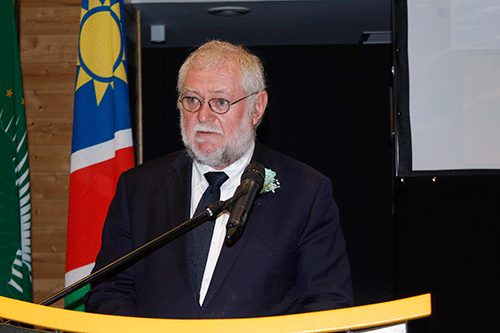WALVIS BAY – Access to secure potable water for human and industrial use has improved over the current plan period, the minister responsible for water affairs Calle Schlettwein announced this week.
In particular, the percentage of rural households with access to potable water within a radius of 2.5 kilometres has increased from the baseline of 91% in 2017/18 to 96% by 2021/22. Also, households with access to improved sanitation facilities improved from 42% in 2016/17 to 54% over the past five years.
“The construction of the Neckartal Dam and eight other earth dams was completed, enabling opportunities for intensive agriculture and enhanced water supply,” Schlettwein said on Monday during the opening of the strategic plan workshop of the ministry underway in Swakopmund.
The workshop is hosted to assess and formulate targeted strategic interventions that will shape the course of outcomes in agriculture, water, and land reform in the near future. According to the minister, at least 267 868 hectares of commercial agricultural land were acquired for resettlement of landless Namibians, exceeding the target of 224 123 hectares by 20%.
“A total of 113 previously disadvantaged landless Namibians were resettled in the Omaheke, Otjozondjupa, Oshikoto, Kunene, Erongo, Hardap, //Kharas and Khomas. At least 60% of the resettled farmers were provided with some form of infrastructure and support services, given the limited financial resources, and over 33 000 Communal Land Rights were registered in communal areas.
The Land Reform Bill has been drafted and provides for more secure communal land tenure,” Schlettwein explained. He added 10 000 hectares of communal land have been developed, adding up to 270 000 hectares of virgin communal land.
The minister further said that flexible land tenure in some local authorities has afforded over 500 Namibians in informal settlements the opportunity to register holding titles for their properties. “These achievements were recorded against a multitude of challenges and risk factors which continue to weigh on the sector.
These challenges include climate change, recurrent droughts, floods and the outbreak of diseases among others. It is, therefore, imperative for us to craft our next set of strategic intent, taking into account these material developments for cost minimisation and leveraging other sources of funding for a more targeted and outcome-oriented strategy,” the minister said.
Hence, he added, the outcome of the strategies will formulate and define the state of national food and nutrition security, progress towards food self-sufficiency, secure water supply, decent sanitation, access and productive use of land.
– edeklerk@nepc.com.na


